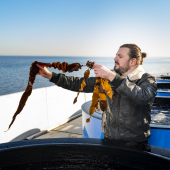
Beyond Competition: Why Collective Growth is the Future of Seaweed
Beyond Competition: Why Collective Growth is the Future of Seaweed
Alexander Ebbing, CTO & Co-founder, Ebbing Tides, The Netherlands

Beyond Competition: Why Collective Growth is the Future of Seaweed
Alexander Ebbing, CTO & Co-founder, Ebbing Tides, The Netherlands
About the speaker:
The last 13 years Alexander Ebbing actively pioneered in the seaweed industry, specializing in seed production and sustainable industry development. With years of research and hands-on experience, he works to transform the seaweed sector by making cultivation more efficient, scalable, and accessible. As the founder of Ebbing Tides, he bridges science and industry to drive innovation and collaboration in the blue economy.
Company info:
Ebbing Tides is dedicated to accelerating the growth of the seaweed industry and seaweed rewilding endeavors. By providing expertise in seed production, cultivation techniques, and sustainable scaling, Ebbing Tides helps businesses and stakeholders develop a robust and resilient seaweed sector that supports food security, ecosystem restoration, and circular economy solutions.
Presentation:
The seaweed industry will not thrive through isolated efforts or competition-driven thinking. This presentation challenges the scarcity mindset and explores how true industry growth comes from collaboration and an abundance mindset. The company delves deeper in how success breeds success, and that when one company grows, it legitimizes the market, attracts investment, and strengthens the industry as a whole. How the exponential age will also influence the seaweed industry, and thus the business models that thrive in this new reality. Let’s explore how collaboration—not competition—fuels industry growth, ensuring that a rising tide lifts all boats. By working together, sharing knowledge, and building strong value chains, it is possible to create a resilient and prosperous seaweed sector that benefits all players involved.
Interview
1. You’ve been active in seaweed for over a decade — how have your views on competition vs. collaboration evolved as the industry has grown?
When I first stepped into the seaweed world, it felt like uncharted territory — a frontier full of promise, but also marked by fragmented efforts and isolated pioneers. Back then, competition often took precedence, driven by the scarcity mindset: limited knowledge, limited resources, and the urge to claim a piece of a still-developing pie.
But as the years unfolded, aided with the experience of working with many seaweed farmers around the world, my perspective shifted dramatically. I now see collaboration not as a feel-good optional extra, but as the only viable strategy for meaningful impact. Seaweed aquaculture isn’t just about building businesses — it’s about reshaping food systems, restoring ecosystems, and reimagining how humanity relates to the ocean. These are systemic challenges, and systems don’t change through competition alone.
In short, the seaweed sector used to see each other as competitors. Now, I hope the seaweed sector will increasingly see each other like fellow travelers. Because the real competition isn’t each other — it’s time, climate change, and outdated systems that no longer serve us.
2. You mentioned that your upcoming presentation will touch on the abundance mindset. Could you share any real-world examples where collaboration has led to success in the seaweed sector?
Absolutely. I’ve seen time and again that when we let go of the scarcity mindset — the idea that we have to protect every secret, guard every technique — something shifts. Doors open. Momentum builds. That’s the abundance mindset in action: trusting that by growing the pie, we all get to eat.
One clear example is the collaborative research we're involved in around MultiAnnual Delayed (MAD) gametophytes. Instead of siloing the knowledge, we’ve engaged with other researchers and industry players, openly sharing our findings about these resilient, long-lived kelp life stages. The result? Not only deeper scientific insights, but also practical steps forward in making precision kelp farming more reliable — from rewilding to direct seeding innovations.
This mindset shift — from zero-sum to infinite game — is what’s allowing the seaweed sector to mature. And it’s what gives me hope that we’re building something regenerative, not just extractive.
3. You mention the exponential age — how do you see emerging technologies and mindsets shaping the next phase of seaweed industry development?
We’re standing at the edge of something wild: the exponential age, where AI, biotechnology, and global connectivity are evolving faster than our institutions can catch up. And while that pace can feel overwhelming, it’s also the biggest opportunity the seaweed sector has ever had.
Emerging technologies are giving us tools to move from the more traditional way of farming kelp to Precision Kelp Farming — think fully automated bioreactors, gametophyte selection using AI, direct seeding systems calibrated by precise sensors, drone technology that monitors your seaweed farm, or even blockchain-backed traceability for ecological claims. These aren’t science fiction anymore. This type of tech is coming fast — and they’re unlocking scale without sacrificing ecological integrity.
But here’s the twist: tech alone isn’t enough. What truly excites me is the potential shift in mindset that is possible alongside it. Younger founders, indigenous scientists, regenerative thinkers — they’re not just trying to build “another industry.” They’re rewriting the story. Moving from extraction to regeneration. From ego systems to ecosystems. This next phase isn’t about who can grow the most seaweed — it’s about who can reimagine the system the most wisely. And I must believe that, in the exponential age, wisdom and collaboration will outpace brute force every time.